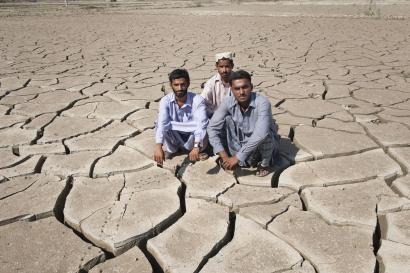Climate Resilient Development case study series

Mercy Corps’ Climate Resilient Development (CRD) approach recognises the need for climate adaptation strategies to be integrated into all long-term development objectives.
This development-first approach builds climate resilience through development strategies that reduce poverty through measures including increased food security, enhanced social cohesion, strengthened governance inclusive of those now marginalised and impoverished.
Our work
Mercy Corps’ capacity to integrate climate change into its broad portfolio of programming has rapidly evolved through experience across nine countries over the past seven years.
Learn about our approach and broader programming
We initiated this series of case studies of our programming to discover the key lessons and best practices for integrating climate change into diverse programmes and contexts.
In developing this series, our intent is to inform how CRD is designed and implemented in Mercy Corps, and share this knowledge to other practitioners and implementation for other agencies grappling with these questions.
Resources
Experiences and lessons in climate change integration
For Mercy Corps, resilience is a process—a way of thinking and acting—not just an end state. We work to build diverse connections and relationships—between people, communities, and the systems that support them—which enable communities to plan, prepare, and manage for change in times of increasingly complex and dynamic crises.
Ethiopia: Integrating climate change into market-based development programming
Pastoralist Areas Resilience Improvement through Market Expansion (PRIME) is a five-year multi-agency project that focuses on supporting pastoralists via expansion of markets and long-term behaviour change. As part of its approach, PRIME integrates strategies aimed at helping communities become more resilient to climate change and its affects on society at various levels.
Ethiopia: Insights on how to operationalise climate integration
Climate change is a complex problem. It can affect all areas of society—from making food and water resources more scarce to causing or exacerbating conflict—which means development must integrate climate resilience across programme areas.
Ethiopia: Experiences from Ethiopia and the Mercy Corps' PRIME programme
As one of the first large, multi-sector programmes to integrate climate resilience across outcomes, PRIME is an opportunity to examine the successes and challenges of integrating climate change adaptation principles and practices.
Georgia: Municipal level climate resilient development planning
Beginning in 2011, Mercy Corps programming in Georgia focused on enhancing the capacity of local and regional stakeholders to develop climate resilient development plans.
Indonesia: A governance approach to building urban climate resilience
The Asian Cities Climate Change Resilience Network (ACCCRN) is a multiyear, $59 million initiative funded by the Rockefeller Foundation to strengthen the capacity of more than 50 rapidly urbanising cities in Bangladesh, India, Indonesia, the Philippines, Thailand and Vietnam, as they survive, adapt, and transform in the face of climate-related shocks and stresses.
Nepal & Timor: A market development approach to climate-informed disaster risk reduction
Mercy Corps is demonstrating a new approach to sustainable Disaster Risk Reduction (DRR) by economically incentivising climate-informed DRR measures in Nepal and Timor Leste.